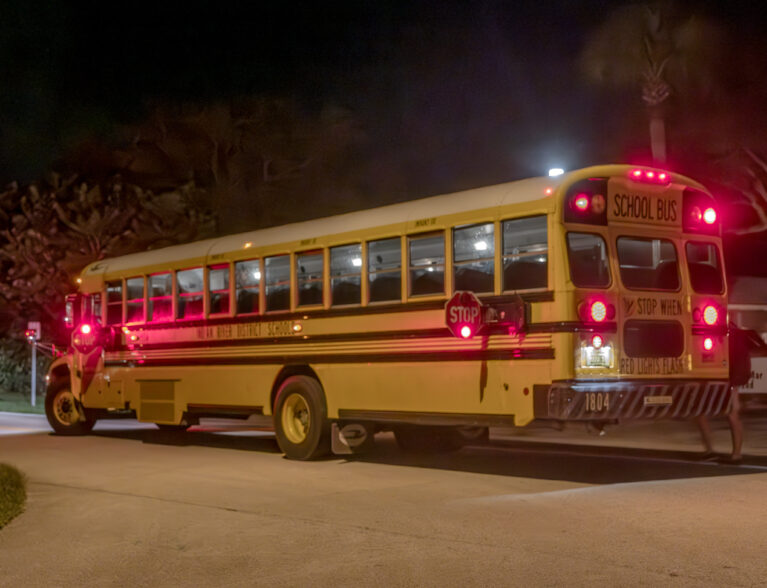
School Superintendent David Moore and Sheriff Eric Flowers were scheduled to meet this week to discuss a crackdown on local motorists who illegally pass school buses that have stopped to pick up or unload students.
The main topic of conversation, Moore said, will be the proposed installation of surveillance cameras on the sides of the district’s school buses to identify and penalize violators.
“We’re not using them yet, but we’re definitely going to take a hard look at it,” Moore said last week. “We’re continuing to get bus drivers reporting to us that they’re seeing cars passing by, ignoring the ‘STOP’ arms and flashing lights.
“In fact, we’ve asked our drivers to keep track of it, and they reported a total of 70 cars in one day,” he added. “So, it’s something we need to address, and recent legislative changes allow us to use cameras to enforce the law.”
In July 2023, the Florida Legislature authorized the use of cameras to increase the safety of schoolchildren by catching motorists who illegally pass stopped school buses and, in a separate-but-related measure, drive beyond the speed limit in school zones.
While many other communities around the state are moving forward with plans to install cameras to catch the school-zone speeders, Moore said the motorists who illegally pass stopped school buses currently pose a greater threat here.
“It’s certainly something to consider, but we’re not receiving many complaints about speeding in school zones,” he said. “The school-bus cameras are a priority.”
School Board Chair Teri Barenborg said she initially brought up the possibility of installing cameras on school buses more than a year ago – after a 10-year-old girl was struck by a passing car and killed while crossing the street to get to her bus in September 2021 in Fort Pierce.
She raised the issue again this year, after the new law was enacted.
“Before the law was changed, a sheriff’s deputy or police officer had to witness cars passing the school bus,” Barenborg said. “Now, we can use cameras to catch them, and we need to.
“I don’t know if it’s because people don’t understand the law, or they’re in such a hurry that they don’t care, but it’s a big issue,” she added. “I’ve seen too many near-misses, including one where the car passed on the right side of the school bus, and one child dying is too many.
“We’ve got to get people’s attention.”
Actually, the law requires any school district, county or municipality that opts to install school-bus cameras to publicly announce – at least 30 days in advance – that it would be implementing the new enforcement measures.
Barenborg said she was eager to pursue the matter, and she hopes the cameras, which in most cases are installed by a private company that monitors the resulting photos and videos of offending motorists, can be operational before the end of the current school year.
“The sooner the better,” she said.
Neither Barenborg nor Moore could provide details about the process, including the Sheriff’s Office’s role and whether that agency or the vendor would mail the subsequent citations to violators.
The Sheriff’s Office did not respond to multiple requests for comment.
According to the Florida Department of Highway Safety and Motor Vehicles, passing a school bus that has stopped to pick up or drop off students is a moving violation that can result in penalties that include:
- Requirement to complete a basic driver-improvement course.
- Four points on your driver license.
- A minimum fine of $265.
However, the minimum fine increases to $465 if a motorist is found guilty of passing the bus on the side where children enter and exit.
In March, the woman driving the car that killed the girl in Fort Pierce was convicted of vehicular homicide and sentenced to 12 years in prison.
“Local law enforcement is equally as interested in doing it as we are,” Moore said. “What we have to do now is figure out: What’s the next step? What do I have to do? What does the sheriff need to do. Who takes the lead?”
Asked about the costs, Moore said the system would “pay for itself over time.”
As for using speed-detection cameras in school zones, Moore said he’ll discuss the possibility with board members.
Photos by Joshua Kodis





